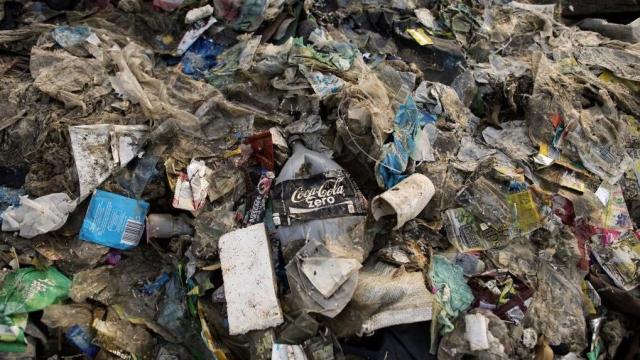Recycling goals from large companies aren’t going to save our seas from plastic pollution.
A new report conducted by sustainability consulting firm Eunomia, which was commissioned by ocean conservation nonprofit Oceana, found that plastic pollution pledges won’t make much difference in the amount of plastic that ends up in the oceans.
The analysis looked at five major soft drink companies — Coca-Cola Company, Nestlé, PepsiCo, Danone, and Keurig Dr Pepper — and their recycling pledges. Each company has promised to increase the amount of recycled materials in their PET plastic bottles from 25% to 50% by 2025 to reduce waste, which sounds great in theory. But the Eunomia analysis found that the recycling pledges from those five companies would only reduce plastic bottle pollution by about 7%, and that means that more than 33 million bottles will still end up in waterways as a result of sales from these companies, the report found.
Dana Miller, Oceana’s strategic initiatives director, said that it isn’t certain that the companies studied would even reach the targets they’ve placed for themselves. She argued that getting rid of single-use plastic pollution shouldn’t have to rely on waiting to see if large corporations follow through with their promises.
“Soft drink brands have been focusing on recycling as the solution to the plastic pollution crisis, but given the findings of this study, Oceana is calling on these companies to prioritise the adoption and expansion of refillable bottles instead,” Miller told Earther. “Adding more recycled content doesn’t stop a single-use plastic bottle from reaching the seas.”
Before soft drink companies turned to single-use plastic bottles as their default throughout the 1980s and 1990s, returnable glass bottles were the norm. Customers would purchase a drink, return what was usually a glass bottle, and be given back a deposit.
“[It’s] shifting baselines,” Miller said. “What is normal for one generation isn’t necessarily what was normal for the generation before. We have grown up with single-use plastic, and this seems normal to use. For our parents, for grandparents, what was normal to them was the refillable bottle system.”
The push to recycle in the last few decades has only filled our oceans with trash. Big oil and gas companies and many large drink companies have used the idea of recycling to pass the responsibility for pollution onto the consumer. However, big companies contribute the most to our waste problem, while consumers are often locked into a broken recycling system that doesn’t work.
Though it will take time and money from businesses and soft drink companies, Miller said that the effort to turn to reusable bottles will be worth it. With the right tracking and cleaning system, PET plastic bottles can be reused up to 20 times, and glass bottles can be reused up to 50 times, according to Oceana.
“The dominant systems globally are focused on single-use plastic…this is not reinventing the wheel,” she said, “It’s an old way of doing things, but it can be improved with current technologies.”
This study isn’t the only way the sustainability group is calling out just how horrible single-use plastic bottles are for the environment, even if they are labelled “recyclable.” Just last month, Oceana collaborated with reality star Heidi Montag to create an Earth Day prank campaign in which she advertised single-use jeans.
